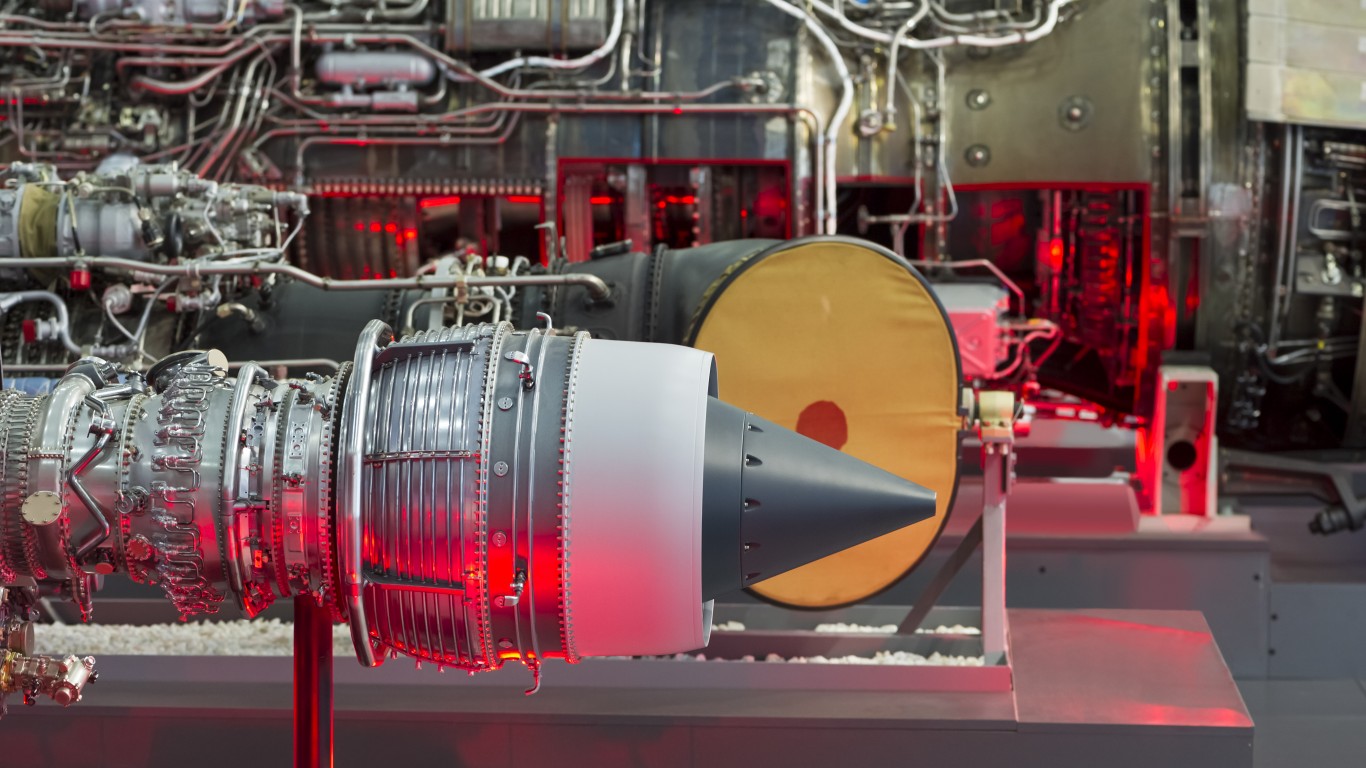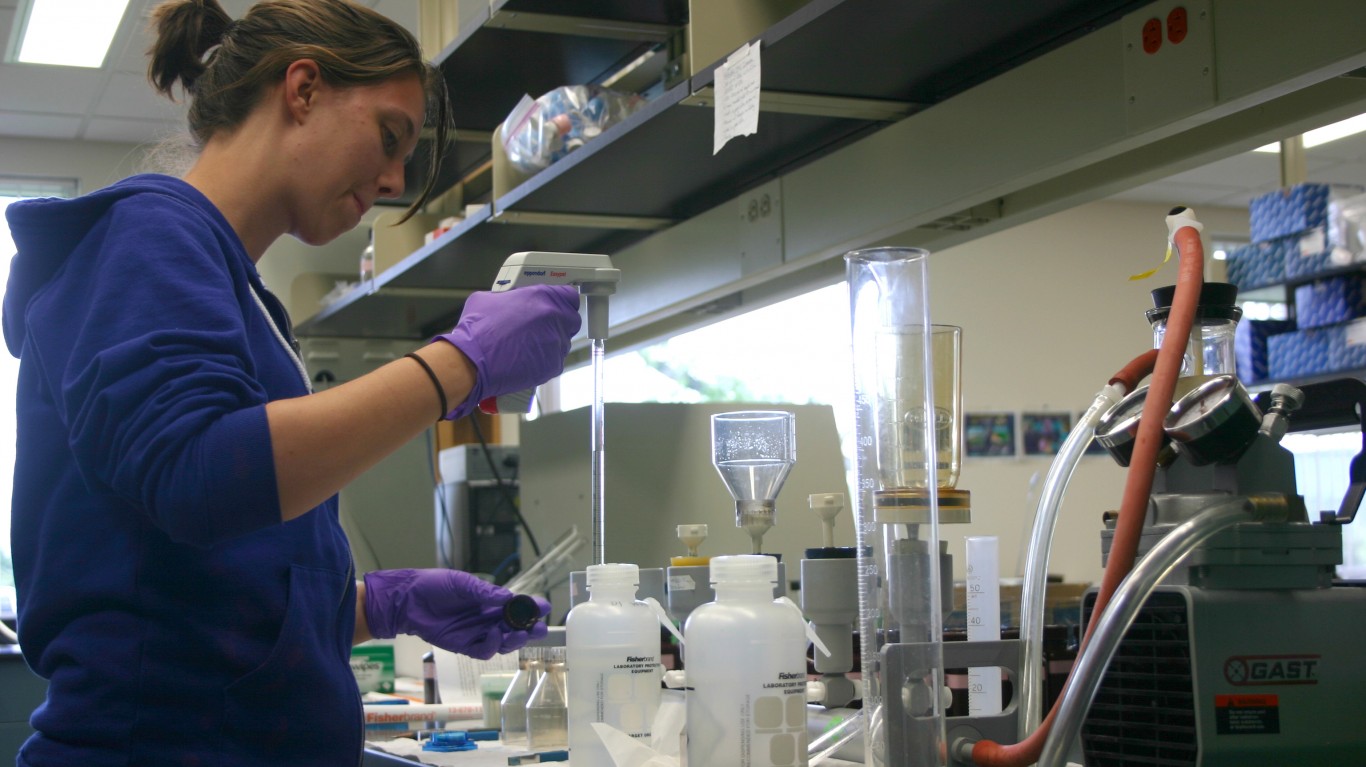Special Report
These Are the College Majors That Pay Off the Most

Published:
Last Updated:

A college education opens the door to higher-paying jobs. College-educated workers 25 and older earned a median income of $56,344 in 2019, according to the U.S. Census Bureau. Workers with no more than a high school diploma earned far less — just under $32,000 per year. Yet not all bachelor’s degrees have the same earning potential with some degree fields generally leading to much higher-income careers than others.
To determine the highest paying college majors — that is, the college majors leading to highest-income careers — 24/7 Wall St. reviewed data on average annual earnings for 173 undergraduate majors from the Public Use Microdata Sample summary files of the U.S. Census Bureau’s 2019 American Community Survey.
The vast majority of the highest paying majors are in STEM — science, technology, engineering, and mathematics — fields. There are eight different engineering majors among the 25 entries on this list as well as a number of medical specialties.
Most of these majors are in fields that require a high level of specialization, such as medicine or research. This means applicants often need advanced degrees — a master’s or even a doctorate — before they can begin working in the field, or in order to advance.
While deciding on a major is important to the future earnings of a student, the college itself is important as well. The quality of the education a college provides, alumni connections, and many other factors can set students up for success — or leave them behind their peers. Students must vet their college choices before enrolling to ensure that they are not overpaying for entry to a lackluster college. These are the top ranked colleges that pay off the least.
Click here to see the highest paying college majors.
Click here to see our methodology.

25. Mining and mineral engineering
> 2019 Avg. annual earnings: $87,606
> 2019 unemployment rate: 4.3%
> 2019 total workforce: 20,823
Mining and mineral engineering is one of the 25 highest paying college majors, with degree holders earning an average of $87,606 in 2019 — more than double the national average annual earnings for all workers of $35,672. Mining and mineral engineers develop methods to locate and extract minerals, such as diamonds or coal, from the Earth.
Workers with this degree tend to be well compensated yet they also have a relatively high unemployment rate at 4.3%. Though this is close to the 2019 U.S. unemployment rate of 4.5%, college graduates are much less likely to be out of work than the typical worker. Just 11 college degree fields have a higher unemployment rate than mining and mineral engineering.
[in-text-ad]

24. Transportation sciences and technologies
> 2019 Avg. annual earnings: $87,686
> 2019 unemployment rate: 2.0%
> 2019 total workforce: 205,800
Transportation sciences and technologies students most frequently work after graduating college as airline pilots, aircraft and avionics equipment technicians, and air traffic controllers after graduating college. In many of the majors on this list, students aim to continue their education and earn a master’s or even doctorate degree. Yet just 20.7% of those with a bachelor’s degree in transportation sciences and technologies go on to earn an advanced degree in the field, one of the lowest percentages on this list or for any of the 173 majors considered.

23. Zoology
> 2019 Avg. annual earnings: $87,985
> 2019 unemployment rate: 1.9%
> 2019 total workforce: 168,436
Students who graduated from college with a bachelor’s degree in zoology went on to earn an average of nearly $88,000 in 2019. Jobs in the field, which involve studying animal physiology and behavior, typically require advanced degrees. Among those with bachelor’s degrees in zoology, 64.0% also earned a master’s degree, and 44.2% earned a doctorate — both among the 10 highest shares in all college degree fields.

22. Genetics
> 2019 Avg. annual earnings: $88,409
> 2019 unemployment rate: 4.1%
> 2019 total workforce: 28,631
Genetics is one of the least common majors in the country, with fewer than 30,000 people holding a bachelor’s degree in the field, as of 2019. Genetics majors study how physical characteristics are passed down through DNA in living organisms. It is one of many STEM fields on this list. More than half of all Americans with a bachelor’s degree in genetics went on to get a master’s, and over one-third also earned their doctorate in genetics.
[in-text-ad-2]

21. Architectural engineering
> 2019 Avg. annual earnings: $88,629
> 2019 unemployment rate: 0.9%
> 2019 total workforce: 28,009
Architectural engineers plan, design, and oversee the construction of buildings and their systems, like the lighting and structural systems. This is a relatively uncommon skillset, as there were just 28,000 architectural engineers working in the U.S. as of 2019. Fewer than 1% of architectural engineers in the labor force were unemployed in 2019, and the average income for such workers was $88,629.

20. Construction services
> 2019 Avg. annual earnings: $88,872
> 2019 unemployment rate: 1.0%
> 2019 total workforce: 143,633
The average earnings of workers with a construction services degree was nearly $89,000 in 2019, and just 1.0% were unemployed — well below the 4.5% national unemployment rate that year. Those who graduate with a construction services major often work as construction majors, cost estimators, or other similar jobs in the construction field. Just 11.5% of those with a bachelor’s degree in construction services also have master’s degree, and just 2.0% hold a doctorate. No other major on this list has a lower share in either advanced degree.
[in-text-ad]

19. Physiology
> 2019 Avg. annual earnings: $89,456
> 2019 unemployment rate: 1.4%
> 2019 total workforce: 164,706
Physiologists study how the body functions and help ensure the body stays in good working order. Many physiologists focus on fitness and exercise, helping patients recover from injuries or stay in shape. More than half of all Americans who completed a physiology bachelor’s degree also earned a master’s, and 34.3% hold a doctorate. Like many other jobs that typically require advanced degrees, physiologists earn relatively high wages, with the average physiologist earning nearly $89,500.

18. Materials science
> 2019 Avg. annual earnings: $89,616
> 2019 unemployment rate: 2.0%
> 2019 total workforce: 38,662
Materials science majors study the properties of matter and how they apply to science and engineering. They can work in a number of laboratory and industrial settings ensuring that fabricated materials can withstand the stress of their usage. Those who majored in materials science had an average annual earning of nearly $90,000 in 2019, one of the highest of any major.

17. Applied mathematics
> 2019 Avg. annual earnings: $89,756
> 2019 unemployment rate: 4.2%
> 2019 total workforce: 56,510
Applied mathematics degree holders often work as data analysts, actuaries, and financial analysts, using mathematics to gather and interpret data. Nearly half of those who earn a bachelor’s degree in applied mathematics also go on to earn a master’s degree. The average worker with an applied mathematics degree earns nearly $90,000 per year, one of the highest average salaries of any degree field.
[in-text-ad-2]

16. Public policy
> 2019 Avg. annual earnings: $89,761
> 2019 unemployment rate: 1.7%
> 2019 total workforce: 50,947
Public policy graduates often work for nonprofits or local, state, or national governments. Some work as consultants for companies looking to determine how governmental regulations could affect their business. Public policy majors typically do not struggle to find work, with just a 1.7% unemployment rate in 2019. For comparison, the average U.S. unemployment rate was 4.5% that year.

15. Mechanical engineering
> 2019 Avg. annual earnings: $89,801
> 2019 unemployment rate: 2.3%
> 2019 total workforce: 1,237,657
Mechanical engineers design, develop, and build machines. The average working American with a mechanical engineering degree earns $89,801 a year, the 15th highest figure of any degree field. The major is one of the most common, with over 1.2 million working mechanical engineers. Just 2.3% of those holding a bachelor’s degree in mechanical engineering were unemployed in 2019, roughly half the unemployment rate for all workers that year.
[in-text-ad]

14. Actuarial Science
> 2019 Avg. annual earnings: $90,399
> 2019 unemployment rate: 2.5%
> 2019 total workforce: 20,036
Actuarial science is one of 14 majors in which the average graduate earns more than $90,000 per year. Actuaries work to analyze the potential financial risks incurred by businesses and individuals, typically on behalf of insurance companies. A bachelor’s degree is generally enough to land a job as an actuary. and fewer than a quarter of actuarial sciences bachelor’s degree holders go on to earn an advanced degree.

13. Mathematics and computer science
> 2019 Avg. annual earnings: $91,843
> 2019 unemployment rate: 1.1%
> 2019 total workforce: 20,824
Mathematics and computer science majors combine the programming and coding skills of a typical computer science major with mathematical skills. Their education can be applied to theoretical computer science, artificial intelligence, and data analysis. Just 1.1% of mathematics and computer science majors were unemployed in 2019, as compared to 4.5% of the U.S. labor force.

12. Chemical engineering
> 2019 Avg. annual earnings: $93,118
> 2019 unemployment rate: 1.9%
> 2019 total workforce: 465,744
Chemical engineers work to produce fuel, food, drugs, and other products. Nearly half of all American workers with bachelor’s degrees in chemical engineering go on to earn a master’s degree as well, and one in six also earn their doctorate. Those with chemical engineering degrees earn more than $93,000 a year on average, well above the $35,672 average annual earnings across the country in 2019.
[in-text-ad-2]

11. Economics
> 2019 Avg. annual earnings: $94,493
> 2019 unemployment rate: 3.1%
> 2019 total workforce: 1,565,623
Economics is one of the most common undergraduate degrees — more than 1.5 million college graduates in the labor force majored in economics. It is one of just 12 fields in which the average annual earnings for workers with an economics degree exceeds $93,000. Many economist jobs require a master’s or doctorate degree, and 41.4% of those who majored in economics in their undergraduate years go on to obtain a master’s degree. Many government economics jobs, however, require only a bachelor’s degree for entry-level positions.

10. Aerospace engineering
> 2019 Avg. annual earnings: $94,685
> 2019 unemployment rate: 2.0%
> 2019 total workforce: 151,680
Aerospace engineers work to create aircraft, spaceships, and national defense systems — jobs that require a great degree of specialization and expertise. Nearly half of those with aerospace engineering bachelor’s degrees go on to earn their master’s as well. Those with higher levels of education are typically paid higher salaries, and the average salary among those with an aerospace engineering degree is $94,685.
[in-text-ad]

9. Biomedical engineering
> 2019 Avg. annual earnings: $94,798
> 2019 unemployment rate: 3.6%
> 2019 total workforce: 91,482
Biomedical engineers design and create medical equipment or devices. Professionals in both the engineering and medical professions tend to be well compensated, and biomedical engineers are no exception, averaging nearly $95,000 in earnings. Over half of those who graduate with a bachelor’s degree in biomedical engineering go on to get a master’s degree, and more than a quarter earn their doctorate.

8. Computer science
> 2019 Avg. annual earnings: $94,816
> 2019 unemployment rate: 3.4%
> 2019 total workforce: 1,686,343
Computer science bachelor’s degree holders are typically able to get high-paying jobs without having to continue their education further. The nearly 1.7 million workers who majored in computer science average nearly $95,000 in annual earnings. Less than a third of computer science majors get a master’s degree, and less than 5% go on to earn their doctorate — both figures are relatively low among majors on this list.

7. Electrical engineering
> 2019 Avg. annual earnings: $95,540
> 2019 unemployment rate: 2.3%
> 2019 total workforce: 1,451,929
Electrical engineering is one of eight engineering majors to rank among the highest paying in the country, with average annual earnings exceeding $95,000. These engineers design, create, and repair electrical equipment. The unemployment rate for those with electrical engineering degrees in 2019 was 2.3% — well below the national 4.5% unemployment rate for the year but still higher than most other majors on this list.
[in-text-ad-2]

6. Finance
> 2019 Avg. annual earnings: $98,610
> 2019 unemployment rate: 2.8%
> 2019 total workforce: 1,559,642
Finance majors are some of the most financially well-off workers, earning an average of $98,610 a year. This degree field allows graduates to work in a wide array of financial careers, including financial managers, analysts, clerks, and consultants, among others. There are over 1.5 million finance majors in the U.S. workforce.

5. Molecular biology
> 2019 Avg. annual earnings: $99,520
> 2019 unemployment rate: 1.9%
> 2019 total workforce: 112,585
The average worker with a degree in molecular biology earns nearly $100,000 per year, one of the highest averages among all fields of study. Molecular biologists study how chemicals work and interact with living organisms, and the field can apply/be relevant to many disciplines, including medicine, agriculture, forensic science, and more. More than 45% of those who get a bachelor’s degree in molecular biology eventually go on to get a doctorate — the third highest share of any major.
[in-text-ad]

4. Biochemical sciences
> 2019 Avg. annual earnings: $103,991
> 2019 unemployment rate: 1.7%
> 2019 total workforce: 300,966
Biochemical sciences majors study the chemical reactions necessary for life. These majors often go on to work in fields like pharmacology, agriculture and food science, environmental science, and more. Those who hold a bachelor’s degree in biochemical sciences majored in one of just four fields of study in which the average earnings exceeded $100,000 in 2019. It is also one of six college majors considered in which more than 40% of all bachelor’s degree holders went on to get their doctorate as well.

3. Computer engineering
> 2019 Avg. annual earnings: $106,276
> 2019 unemployment rate: 2.6%
> 2019 total workforce: 421,802
Computer engineering majors learn how to design and build computer hardware and software. Computer engineering is one of the more common, and highest paying, majors available in college. There are over 420,000 workers with computer engineering degrees, and the average graduate makes over $106,000. Unlike the other college majors with six-figure incomes, computer engineers generally do not need an advanced degree. In the other three college majors that meet the salary threshold, more than 44% of degree holders went on to get their doctorate, compared to less than 5% of computer engineering majors.

2. Pharmacology
> 2019 Avg. annual earnings: $106,536
> 2019 unemployment rate: 2.0%
> 2019 total workforce: 17,017
Pharmacologists study how drugs interact with the human body. This highly specialized major can prepare students for a career as a pharmacist, toxicologist, and other scientifically focused careers. These careers tend to be high paying, and the average graduate of a pharmacology program in college earns over $106,000. There are relatively few pharmacology bachelor’s degree holders, at just over 17,000. This is by far the fewest graduates of any major on this list.
[in-text-ad-2]

1. Health and medical preparatory programs
> 2019 Avg. annual earnings: $107,638
> 2019 unemployment rate: 1.9%
> 2019 total workforce: 146,806
Health and medical preparatory programs, sometimes known as a “pre-med” major, prepare college students to become medical professionals, like doctors, nurses, optometrists, dentists, and more. These medical professions tend to pay well, as graduates with this major report average annual earnings of $107,638 — more than any other major considered. This major has by far the highest doctorate degree attainment rate at 63.3%. No other degree has even 50%. Health and medical preparatory programs majors also have very low unemployment, at just under 2% in 2019. The national unemployment rate for all occupations that year was 4.5%.
Methodology:
To determine the highest paying college majors, 24/7 Wall St. reviewed data on average annual earnings for 173 undergraduate majors from the Public Use Microdata Sample summary files of the U.S. Census Bureau’s 2019 American Community Survey. Data on field of study and employment status are self reported by the survey’s respondents. While respondents were able to list the field of study for any bachelor’s degree they have received and may have listed multiple majors, only the first major listed was considered in this analysis. Additional data on unemployment status and workforce size came from the 2019 ACS.
Want retirement to come a few years earlier than you’d planned? Or are you ready to retire now, but want an extra set of eyes on your finances?
Now you can speak with up to 3 financial experts in your area for FREE. By simply clicking here you can begin to match with financial professionals who can help you build your plan to retire early. And the best part? The first conversation with them is free.
Click here to match with up to 3 financial pros who would be excited to help you make financial decisions.
Have questions about retirement or personal finance? Email us at [email protected]!
By emailing your questions to 24/7 Wall St., you agree to have them published anonymously on a673b.bigscoots-temp.com.
By submitting your story, you understand and agree that we may use your story, or versions of it, in all media and platforms, including via third parties.
Thank you for reading! Have some feedback for us?
Contact the 24/7 Wall St. editorial team.